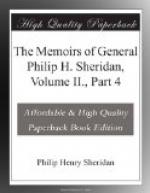“You can trust the bearer.”
“I am, very respectfully, your most obedient servant,
“P. H. Sheridan, Major-General Commanding.”
“September 16, 1864.
“I have no communication whatever with the rebels, but will tell you what I know. The division of General Kershaw, and Cutshaw’s artillery, twelve guns and men, General Anderson commanding, have been sent away, and no more are expected, as they cannot be spared from Richmond. I do not know how the troops are situated, but the force is much smaller than represented. I will take pleasure hereafter in learning all I can of their strength and position, and the bearer may call again.
“Very respectfully yours,” ............
Miss Wright’s answer proved of more value to me than she anticipated, for it not only quieted the conflicting reports concerning Anderson’s corps, but was most important in showing positively that Kershaw was gone, and this circumstance led, three days later, to the battle of the Opequon, or Winchester as it has been unofficially called. Word to the effect that some of Early’s troops were under orders to return to Petersburg, and would start back at the first favorable opportunity, had been communicated to me already from many sources, but we had not been able to ascertain the date for their departure. Now that they had actually started, I decided to wait before offering battle until Kershaw had gone so far as to preclude his return, feeling confident that my prudence would be justified by the improved chances of victory; and then, besides, Mr. Stanton kept reminding me that positive success was necessary to counteract the political dissatisfaction existing in some of the Northern States. This course was advised and approved by General Grant, but even with his powerful backing it was difficult to resist the persistent pressure of those whose judgment, warped by their interests in the Baltimore and Ohio railroad, was often confused and misled by stories of scouts (sent out from Washington), averring that Kershaw and Fitzhugh Lee had returned to Petersburg, Breckenridge to southwestern Virginia, and at one time even maintaining that Early’s whole army was east of the Blue Ridge, and its commander himself at Gordonsville.
During the inactivity prevailing in my army for the ten days preceding Miss Wright’s communication the infantry was quiet, with the exception of Getty’s division, which made a reconnoissance to the Opequon, and developed a heavy force of the enemy at Edwards’s Corners. The cavalry, however, was employed a good deal in this interval skirmishing heavily at times to maintain a space about six miles in width between the hostile lines, for I wished to control this ground so that when I was released from the instructions of August 12, I could move my men into position for attack without the knowledge of Early. The most noteworthy of these mounted encounters was that of McIntosh’s brigade, which captured the Eighth South Carolina at Abraham’s Creek September 13.




